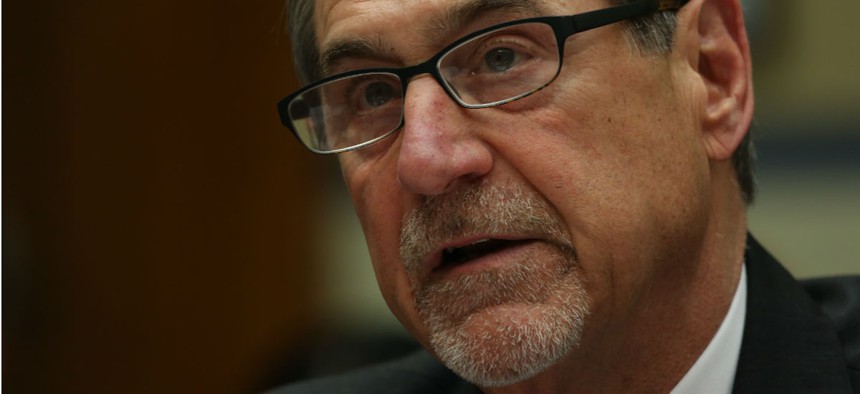
Former Census Bureau Director John Thompson Flickr user OversightandReform
Ex-Census Director: 'I Didn’t Leave Because of Politics'
Thompson urges Congress to provide full 2019 funding and praises bureau career staff.
John Thompson, who surprised Washington in May with his sudden resignation as director of the Census Bureau, on Tuesday rejected suggestions that his departure was due to political tensions, saying the Trump administration is properly relying on career staff to carry forward plans for the 2020 count.
Speaking on his own behalf to reporters at the National Press Club, Thompson—who just began a job at the Council of Professional Associations on Federal Statistics—also rejected theories that the Trump team had pressured the bureau this spring to cancel plans to add a LGBT category to the American Community Survey.
“I didn’t leave because of politics” and had no positions under the Obama administration that “differed with the current administration,” said Thompson, calling his departure story “not exciting.” As an Obama appointee whose scheduled departure date had already been extended from December 2016, Thompson said he “retired because I’d reached a point where I’d done all I could do” after having guided the bureau through the presidential transition and the onboarding of Trump appointees.
Commerce Secretary Wilbur Ross “understood what I was doing and wished me well,” Thompson said. He gave Ross credit for calling an early meeting with him on the 2020 census and being “committed to a fair and accurate census.”
The good news, Thompson said, is that the Trump people “do rely on the career people”—the two now in charge being Ron Jarmin as acting director and Enrique Lamas performing the duties of the deputy director and chief operating officer.
“I didn’t get the idea that career management was running around in panic—they have a number of things in hand,” Thompson added.
Many lawmakers and outside observers of the Census Bureau have been expressing concerns about Congress’ reluctance to provide funding needed for the bureau to perform timely tests in preparation for the decennial count.
Asked about the mysterious May decision to drop the proposed LGBT category from the next survey, Thompson said Census employees had done the detailed work in considering a new category requested by agencies such as the Housing and Urban Development Department and the Environmental Protection Agency. But “in the end, when the Commerce career attorneys were ready to move forward” to send the revised questionnaire to the Office of Management and Budget and Congress, it seemed appropriate to ask the Justice Department lawyers to reconfirm the plan. In addition, there were questions as to whether such a category is appropriate in surveys that go only to respondents in small geographic areas, he said.
“For one of these reasons, it was not deemed appropriate for American Community Survey,” he added. “If there had been political meddling, I would have gotten calls from the administration, and I didn’t get any.”
Overall, Thompson pronounced himself “optimistic” that the coming big count will be efficient, fair and accurate. The bad news, he said, is that the bureau is underfunded by about $200 million needed in 2018 for end-to-end testing of the self-response and in-person enumeration tools. For the past several years, it has been difficult dealing with uncertainty caused by Congress’ reliance on continuing resolutions for its budgeting, he acknowledged, which meant that many preparatory steps and tests were postponed. There have also been delays in some all-important advertising and cultivation of partnerships with local governments and organizations essential to encouraging participation and overcoming distrust of government in order to avoid an undercount in hard-to-reach communities.
The run-ups to past censuses have been accomplished without a full-time director, Thompson said. “It’s good to have a director, but I don’t think there will be a new appointee soon.”







